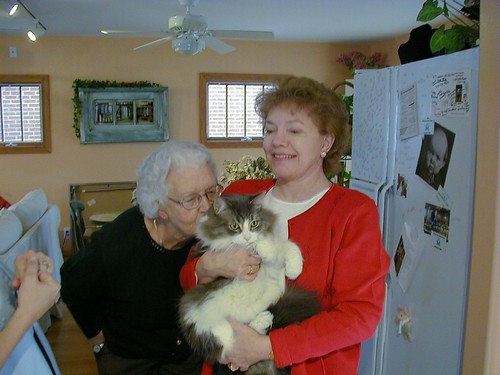I feel old. I'm sore, I shuffle around the house slowly, and I spend my time concerned with bodily functions that used to take care of themselves. But I feel much stronger. My odds look somewhat better than they did before but not dramatically better. I think I'm just feeling relief that the worst of the cancer is out of me. There could still be a dangerous amount in there, but the odds are we dealt the cancer a fatal blow, and for the first time I'm able to enjoy the odds that I will live instead of being fixated on the odds that I will die.
I hear that's a very typical reaction. I've spoken to other prostate cancer survivors who felt the same way after surgery. My surgeon had no surprise or irony in his voice when he walked into my hospital room the day after the surgery, found me hunched over in pain, multiple tubes hanging off of me, and he said "You look the best I've ever seen you." He was right. The other times he saw me I was terrified. Now I feel that while the war continues, an important battle was won. My wounds were earned in that battle and I do not regret them.
Technically the robotic-assisted prostatectomy is a very high-tech type of laproscopic surgery. I was always suspicious of laproscopic surgery because it seemed like the surgeon was just adding a degree of difficulty to show off, like building a ship in a bottle. Why not try it blindfolded next? It's called "minimally invasive" surgery but it still feels pretty darn invasive. They cut multiple holes in me. Then I spent four hours on a table, intubated, tipped so my feet were higher than my head, while robotic arms reached inside of me, cut parts of me out, and put other parts back together.
Still, I'm completely sold. I woke up in agony but I have literally been improving by the hour. I take a nap and I wake up feeling better. The recovery is remarkable. The surgery team members are the real heroes of the battle, but the da Vinci robot is an amazing tool, giving the surgeon superhuman vision, dexterity, and precision.
I didn't actually want to meet the robot but I did. They wheeled me into the operating room and there he was, his spider-like arms folded against him as he lurked against the wall. "Hello," I said, and everybody laughed. And then moments later (it seemed) I was waking up in the recovery room.
Some specifics:
The Cancer
We're awaiting the pathology report on the prostate, surrounding tissues, and lymph nodes. During the surgery they saw some tissues outside the prostate and a lymph node that looked suspicious but preliminary tests suggested they were not cancerous. So that's good. The doctors didn't see any evidence of an "extension", so that's good, too. Ultimately each of those things will just be rough predictors, though, of the all-important PSA tests to come. With the prostate gone there shouldn't be anything left to make PSA. If there is significant PSA in my blood then something must be left making it. We don't want that.
The Pain
At first I was miserable. Anything that used my abdominal muscles was impossible. On my first walk at the hospital I accidentally coughed and my knees almost buckled from the pain. Hour-by-hour I improved, though, and now I'm still sore but functional. If improvement keeps up at this rate I should be feeling pretty much okay in a couple of days.
The Swelling
I gained (and am now losing again) a belly. On Thursday when I stood up I looked and felt pregnant. That's going away rapidly. I am still several pounds heavier than when I arrived at the hospital, which is amazing considering I went a couple of days without eating.
All that loose fluid is looking for a place to go. In a male, there are places. I'm told not to get used to it. Alas, that swelling will go down, too.
The Catheter
I woke up from surgery feeling like I was in one of the tanks from The Matrix. I had two different IVs, a tube running though my abdomen to my bladder, and yet another gruesome, parasitic thing called a "Jackson-Pratt drain" that I didn't even discover until hours later.
They had to put in a regular Foley catheter (named after it's inventor, Damian Catheter) during the surgery. Fortunately they took that catheter out before they woke me up.
This urology practice leaves most patients with a catheter that passes through a small hole in the skin. So I do have a bag for a few days, but from what I hear it's a much less irritating experience to have the tube running out my belly than than the alternative.
The Incision
There is only one hole big enough to be called an "incision." That's the one they had to make a little bigger to actually take the prostate out in one piece. The rest they call "ports", which is apparently what doctors say instead of "holes we made in you." I literally have lost track of how many ports they made. None of them is very impressive, though, so when I'm done healing I expect I'll look like I was stabbed repeatedly will a ball-point pen.
The Side Effects
You probably know the two main side effects that can happen with prostatectomies. Without going into detail, I'll just say that early indications are quite favorable on both fronts. Hopefully the combination of my relative youth and the surgeon's skill will mean I get out of this with everything functioning properly.
The Surgeon
Dr. Hans Stricker at Henry Ford Hospital's
Vattikuti Urology Institute did the surgery. Dr. Stricker came recommended by people who have worked with him and the staff at Henry Ford West Bloomfield seem to worship him. He's an impressive, patient, and compassionate guy.
We're lucky in southeastern Michigan to have more than our share of top-notch surgeons. Dr. Menon and Dr. Peabody were also recommended at Henry Ford. At the University of Michigan Hospital we met with
Dr. Brent Hollenbeck and we were impressed by him. And a well-known and highly-recommended surgeon at the U of M is
Dr. David Wood. His name came up often as we were looking around.
The Kids
They all seem glad I'm home. Harrison is concerned but not overly so. Grace has the occasional question and seems easily satisfied with the answers. The Twinlets know that Daddy has a boo-boo and he can't pick them up for a little while. We've got help from Grandma and others, so the kids' lives are going on pretty much as usual.
The Home Nurse
Sarah excels at whatever she does and this is no exception. We've made a few mistakes in tube management and "port" dressings. By the time I'm all healed, though, we'll be experts and Sarah will be ready to do this professionally. But she won't.
So the bottom line is I may still have cancer but we've probably beaten it, I'm still worried but less so, and I do feel old, but like Benjamin Button, I seem to be getting younger by the day.



